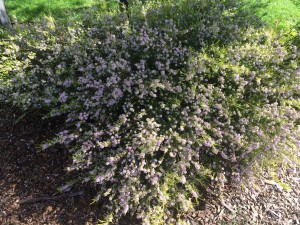I was listening to Modern Pagan Podcast’s (Correction: Pagan Weekly News) June 10th episode where RevKess and Zaracon discussed the Colorado wildfires. (Thank you for mentioning the anthology and blog!) Even in cities sixty miles away from the major blaze, there is thick smoke tainting the air with its acrid smell. The haze dims streetlights and fills store entryways. If you are near the wildfire areas, it’s important to pay attention to air quality reports especially if you are elderly, have a lung condition such as asthma, or a heart condition.
The show played Peter Beckley’s segment “The Implications of Magic Without Forethought” A full transcript is also available. He lives in Missouri and has other free segments and homesteading information at www.thatwitchyplace.com He was concerned with all of the well meaning emails and Facebook posts requesting people light a candle or send energy for rain. The problem is such requests aren’t focused. After all, when the collective will manifests from so many people how much rain will there be? I can envision the consequences of too much rain such as flash flood or land slides. If acres of trees have been destroyed, then there isn’t much to anchor the soil.
Instead we could offer up energy and will for the protection of fire fighters. The safety of evacuees. Sometimes in news reports the fire fighters will comment on what kind of weather would aid their efforts. That is something to focus on.Those in the area could reflect on their relationship with the area spirits and ask them for guidance concerning what is needed to protect all beings both human and animal and their homes. I’m sure readers can come up with more ideas.
And now for the practical.
Actions to Take Before an Emergency
Have a disaster supply kit. You can find preparation ideas at the FEMA site ready.gov For specific information and items to carry you can read my post “Are you prepared for a medical emergency?”
Actions to Take During a Wildfire
If you have been advised to evacuate your home, do it immediately. Take your disaster supply kit with you, lock your home up, and select a route away from the wildfire. Pay close attention to changes in both the direction and the speed of the fire, as well as the smoke. Make sure you tell someone where you left and where you are going to.
I want to ad that if you have time, gather up the following items:
identification, such as driver’s licenses and Social Security cards (These can be used at your local Family Services office for temporary funding for shelter, medical, and Food Stamps (SNAP) assistance.
insurance information
medication information
eyeglasses,hearing aids or other prosthetic devices
valuables, such as credit cards, bank books, cash and jewelry
If you see a wildfire, but have not received an order to evacuate yet, call 911. Do not make the assumption that somebody else has already called. Describe the location of the fire to the 911 operator; speak clearly and slowly, and answer the questions the operator asks. If you are not ordered to evacuate and still have time to prepare your home, there are several actions you can take.
Make arrangements to stay temporarily with a relative or a friend who lives outside of the area that is threatened by the wildfire if you need to evacuate. Wear protective clothing when you go outside such as:
Gloves
Long pants
Sturdy shoes
A long-sleeved shirt
Cotton or wool clothes
A handkerchief to protect your faceGather together your fire tools such as an axe, a rake, a hand or chainsaw, your shovel and bucket. Close any vents to your attic, eaves, the basement, any doors, windows, or pet doors. Remove any curtains or drapes that are flammable. Make sure you close any blinds, shutters, or heavy non-combustible window coverings in order to reduce the amount of radiant heat.
Close all the doors inside of your house to prevent draft. Open the damper on your fireplace, but make sure you close the screen to your fireplace. Shut off any natural gas, fuel oil, or propane at the source. Connect your garden hoses to outdoor faucets, fill any hot tubs or swimming pools, as well as any tubs, garbage cans, or other large containers that can hold water.
Put any lawn sprinklers you have on the roof of your home and close to above-ground fuel tanks. Leave your sprinklers on and wetting-down your home and fuel tanks as long as you can. If you have gas-powered pumps for water, be sure they are fueled and ready to go. Put a ladder against your house in plain view.
If you have an automatic garage door opener disconnect it so the garage door can be opened manually if the power goes out and close the garage door. Put valuable mementos, paperwork, or anything you simply can’t live without inside of your car so you can leave quickly. Put your pets in the car. Put any valuables you own that will not be damaged by water into a pool or pond. Move furniture that is flammable into the center of your home and away from windows or sliding glass doors. Turn the outside lights on and leave a light on in every room in your home to make it more visible in heavy smoke. (Wildfires – Before, During and After the Crisis)
Health Threat From Wildfire Smoke
Smoke from wildfires is a mixture of gases and fine particles from burning trees and other plant materials. Smoke can hurt your eyes, irritate your respiratory system, and worsen chronic heart and lung diseases.
How to tell if smoke is affecting you
Smoke can cause—Coughing
A scratchy throat
Irritated sinuses
Shortness of breath
Chest pain
Headaches
Stinging eyes
A runny nose
Asthma exacerbationsIf you have heart or lung disease, smoke might make your symptoms worse.
People who have heart disease might experience—
Chest pain
Rapid heartbeat
Shortness of breath
FatigueSmoke may worsen symptoms for people who have pre-existing respiratory conditions, such as respiratory allergies, asthma, and chronic obstructive pulmonary disease (COPD), in the following ways:
Inability to breathe normally
Cough with or without mucus
Chest discomfort
Wheezing and shortness of breathWhen smoke levels are high enough, even healthy people may experience some of these symptoms.
Know whether you are at riskIf you have heart or lung disease, such as congestive heart failure, angina, COPD, emphysema, or asthma, you are at higher risk of having health problems than healthy people.
Older adults are more likely to be affected by smoke, possibly because they are more likely to have heart or lung diseases than younger people.
Children are more likely to be affected by health threats from smoke because their airways are still developing and because they breathe more air per pound of body weight than adults. Children also are more likely to be active outdoors.
Protect yourselfPay attention to local air quality reports. Listen and watch for news or health warnings about smoke. Find out if your community provides reports about the Environmental Protection Agency’s Air Quality Index (AQI). Also pay attention to public health messages about taking additional safety measures.
Refer to visibility guides if they are available. Not every community has a monitor that measures the amount of particles that are in the air. In the western part of the United States, some communities have guidelines to help people estimate AQI based on how far they can see.
If you are advised to stay indoors, keep indoor air as clean as possible. Keep windows and doors closed unless it is extremely hot outside. Run an air conditioner if you have one, but keep the fresh-air intake closed and the filter clean to prevent outdoor smoke from getting inside. If you do not have an air conditioner and it is too warm to stay inside with the windows closed, seek shelter elsewhere.
Do not add to indoor pollution. When smoke levels are high, do not use anything that burns, such as candles, fireplaces, or gas stoves. Do not vacuum, because vacuuming stirs up particles already inside your home. Do not smoke, because smoking puts even more pollution into the air.
Follow your doctor’s advice about medicines and about your respiratory management plan if you have asthma or another lung disease, Call your doctor if your symptoms worsen.
Do not rely on dust masks for protection. Paper “comfort” or “dust” masks commonly found at hardware stores are designed to trap large particles, such as sawdust. These masks will not protect your lungs from smoke. An “N95” mask, properly worn, will offer some protection. For more information about effective masks, see the Respirator Fact Sheet provided by CDC’s National Institute for Occupational Safety and Health. (CDC Smoke)
The First 24 Hours – Securing Yourself and The Site
Contact your local disaster relief service, such as the American Red Cross or the Salvation Army, to help with your immediate needs, such as:
temporary housing
food
medicine
eyeglasses
clothing
other essential itemsContact your insurance agent/company.
Cautions!!!
Do not enter the damaged site. Fires can rekindle from hidden, smoldering remains.
Normally, the fire department will see that utilities (water, electricity and natural gas) are either safe to use or are disconnected before they leave the site. Do not attempt to turn on utilities yourself.
Be watchful for structural damage caused by the fire. Roofs and floors may be damaged and subject to collapse.
Food, beverages and medicine exposed to heat, smoke, soot and water should not be consumed.
Leaving Your Home
Contact your local police departments to let them know the site will be unoccupied.
In some cases it may be necessary to board up openings to discourage trespassers.
Beginning immediately, save receipts for any money you spend. These receipts are important in showing the insurance company what money you have spent related to your fire loss and also for verifying losses claimed on your income tax.
If it is safe to do so, try to locate the following items:identification, such as driver’s licenses and Social Security cards
insurance information
medication information
eyeglasses,hearing aids or other prosthetic devices
valuables, such as credit cards, bank books, cash and jewelry (CDC)
References:
“Wildfires – Before, During and After the Crisis” Disabled World















